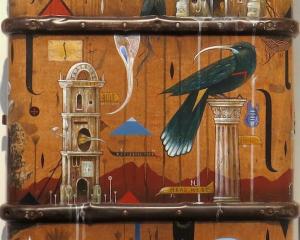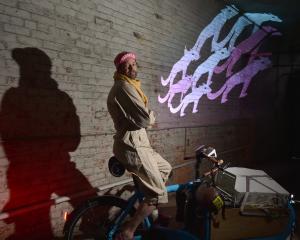In the Temple Gallery's retrospective, the artist is represented by several aspects of her oeuvre.
The room is dominated by two sinuous burnished aluminium screens, their forms dancing across the centre of the gallery space. Around these sit photographs, graceful and bold, which are enhanced by the presence of the screens. The gallery becomes a stage and, rather than simply photographs, the subjects become ritual dancers whirling around the central sculpture.
The photographs range from soft, low-key character studies such as a print from the Julia Morrison Suite to the full theatricality of A Midsummer Night's Dream at Moutoa Gardens, its statue-like figure balanced by the protest flags and audience which loom from the background.
Perhaps even more memorable is an untitled 1981 work in which a heavily decorated face looms from the grasp of a massive, shiny, darkness.
The exhibition consists of six large works, along with a series of five smaller pieces. Each of the items is centred on a strong circular motif placed at the centre of a square surface. This simple template forms a basis for the artist's exploration of the painting and sculpting process, the polymer, oil, and acrylic being laid thickly before being drawn off by techniques such as decalcomania (the laying of material over the wet paint, the removal of which leaves flowing ripples in the surface).
The resulting pieces are dynamic, flowing forms, their rigid/supple duality representing for the artist the control and fluidity of music in visual form. The exhibition is accompanied by a fascinating scrapbook of the artist's thoughts and working practices which indicate the influence of music, east Asian art, and scientific images of the natural world, all of which are absorbed into his art process.
The exhibition's opening accompanied the launch of a novel by Fredrik Brouneus which is illustrated by Tarasiewicz, and which is available from the gallery.
Paterson's latest exhibition at the Milford does not disappoint. The artist has taken his theme of the osmotic mixing of traditional Pacific design with European textures one stage further than previously, using the idea of wallpaper as a literal basis for his work. Rather than being content with interplay of traditional and faux exotica on canvas, the works have exploded on to the walls via a series of massive PVC panels, turning the gallery space into a shifting patterned wharenui in which the panels replace tukutuku and the glitter canvases become windows into a shimmering kaleidoscope world beyond.
The use of panels in this way is a bold, confident stroke, turning the gallery into Paterson's "House of Rainbow". With influences ranging from hibiscus-patterned Pasifika fabric to Scottish paisley by way of op art, we are presented with Pacific views of European tradition, European views of Pacific tradition, and the whole blending milieu in which these views reflect upon each other.
More than this, we are presented with joyous exuberance in a setting of its own devising that is simultaneously skilfully created art and a feast for the eye.












![... we all become all of these things [installation view] (2025), by Megan Brady.](https://www.odt.co.nz/sites/default/files/styles/odt_landscape_small_related_stories/public/story/2025/03/1_we_all_become_all_of_thes.jpg?itok=nicA_yAm)